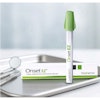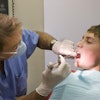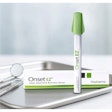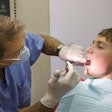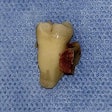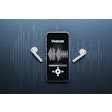
A recent report in the American Journal of Preventive Medicine (June 2012, Vol. 42:6, pp. 563-570) suggested that an additional 30 million Americans will be obese in 16 years (costing an additional $549.5 billion on medical expenditures), and the U.S. Centers for Disease Control and Prevention is reporting that 35% of U.S. adults are obese today.
How many of your patients are overweight? How many would you consider obese (that is, a body mass index [BMI] ≥ 30.0 kg/m2)? What percentage of your patients are taking some sort of weight-loss medication or supplement? Do you ask them if they are taking Belviq (lorcaserin) or Xenical (orlistat), two FDA-approved drugs that require a prescription, or another supplement?
As Mark Donaldson, BSP, PharmD, the director of pharmacy services at the Kalispell Regional Medical Center in Montana, told DrBicuspid.com, it becomes apparent that all clinicians -- including dentists -- will be treating more and more patients on weight-loss medications.
Donaldson said that even before Medicare's landmark 2004 decision that classified obesity as a medical condition, he had been doing research and teaching on metabolic syndrome, syndrome X, type 2 diabetes, and obesity, recognizing the shared pathophysiology among these different descriptors.
"When Medicare made its announcement in 2004 that it would remove barriers to covering antiobesity treatments, after 40 years of saying fat was not an illness, it essentially turned obesity from a personal failure into a medical problem," he said.
"Patients became vilified that they had a medical issue requiring a medical solution, while practitioners who had historically told patients to simply 'eat less and get more exercise' were suddenly required to study this disease more thoroughly and be prepared to prescribe a more appropriate solution," he said.
In a recent article in Journal of the American Dental Association (January 2014, Vol. 145:1, pp. 70-74), Donaldson and co-authors Jason Goodchild, DMD, and Jane Ziegler, DCN, RD, LDN, address this situation directly, looking at the most commonly used prescription weight-loss medications and any considerations dentists need to consider for patients who are taking these medications. They also included recommendations for potential changes in patient care.
“Often, a clinicians' interview technique is the most important tool to get the best, most accurate information to avoid potential complications.”
The authors reviewed the literature, looking at interactions that were of greatest concern, focusing on evidence from randomized controlled clinical trials or meta-analyses.
The authors concluded that patients using orlistat may safely receive medications commonly used in dentistry and may safely undergo dental treatment. However, that advice may not always apply to patients using other weight-loss medications, particularly, but not limited to, those that modify the central nervous system neurotransmission of norepinephrine, dopamine, or serotonin.
The authors advised awareness of the potential for hypertension and cardiotoxicity in these patients, and recommended that the patients' blood pressure and pulse should be closely monitored, especially when using local anesthetics with a vasoconstrictor. Practitioners should stay current with the literature as new weight-loss medications become available in order to avoid interactions with drugs commonly used in dentistry.
Donaldson, also a clinical professor at the University of Montana Skaggs School of Pharmacy in Missoula and a clinical assistant professor at the Oregon Health & Sciences University School of Dentistry in Portland, OR, took a few minutes to talk with DrBicuspid.com about his article and what dental professionals can do to become more aware of these issues.
Donaldson emphasized that the first step is always to mitigate risk.
"This starts with every appointment as the dentist interviews the patient to update their medical and pharmacological histories," he said. "Often a clinicians' interview technique is the most important tool to get the best, most accurate information to avoid potential complications."
He said that patients may misunderstand the question "Are you taking any drugs?" and suggested that dentists rephrase the question as "Are you taking any medications?" Even then, dentists may need to ask more, such as "What do you do when your rheumatism acts up?" and "Do you take any herbal or nutraceuticals?"
"In the above example, it took four questions to get good, accurate information," Donaldson said. "If the clinician had stopped after the first question and this had been a sedation appointment, the patient could have had an untoward reaction."
He then mentioned phentermine, which is also taken for weight loss.
"If they had been taking phentermine for weight loss and had not mentioned it, this could have resulted in a less predictable appointment for the dentist."
Having patients bring in a list of what they are taking, or even the actual medications themselves, is often helpful too for any medical or dental appointment.
"There needs to be a trusting relationship between the oral healthcare professional and the patient such that information flows smoothly, communication is always open, and that a shared goal is always at the forefront of our minds: patient safety," Donaldson said.
He also stated that having a reliable resource to get good, quick information is important. He mentioned Lexi-Comp, Micromedex, Epocrates, and Tarascon as some examples.
"Just keep in mind that the data repository that works is the one you use," he said. "Buying a subscription to a reference, but not actually reading or using this tool, while it may help you sleep at night, does not actually improve patient safety."
Donaldson also recognizes that this can become an opportunity for dental practices as well.
Not all offices and clinics are currently inspected by the Joint Commission, the Centers for Medicare and Medicaid Services, or the Department of Public Health and Human Services, "but what if they were?" he asked. "Being 'survey ready' all of the time should force practitioners to emphasize quality, safety and compliance in all that they do every day."
Donaldson mentioned that one way to ensure your office is prepared is to not only update the patient's medical and pharmacological history on every appointment, but initial and date that you have done so.
"Updating any preprinted forms that patients complete to include weight-loss medications -- in the same way that practitioners have added bisphosphonates, the new antiplatelet agents (ticagrelor, prasugrel), and the new anticoagulants (rivaroxaban, apixaban, dabigatran) -- may be another way to improve compliance," he stated.
"At the end of the day," he said, "if you have an opportunity to improve patient care and make dental appointments even safer, why would you not take that opportunity?"


